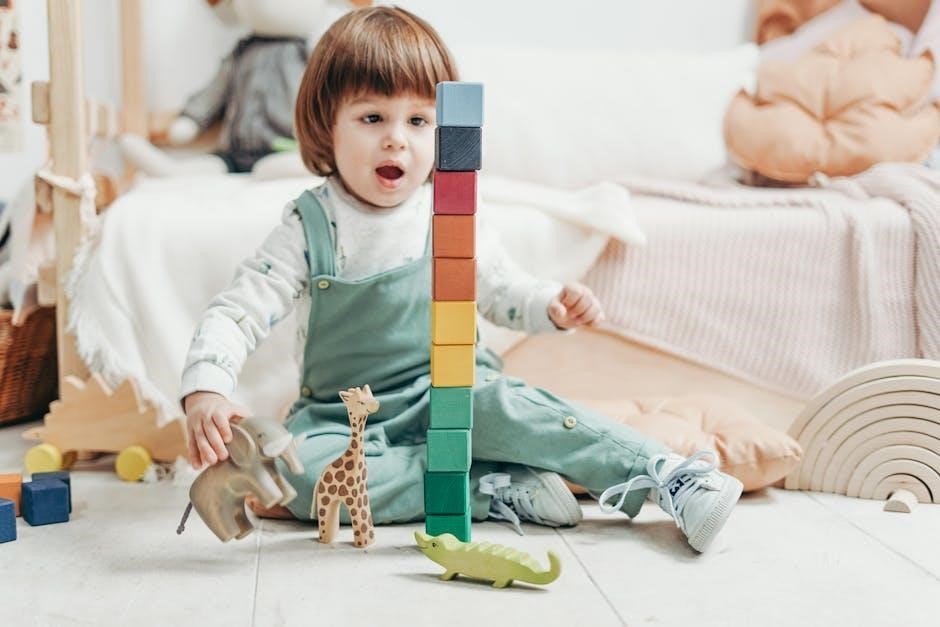Kindergarten readiness ensures a smooth transition to formal education, focusing on essential skills like social-emotional development, language, and physical abilities. A checklist helps identify areas needing support.
1.1. Importance of Kindergarten Readiness
Kindergarten readiness is crucial as it lays the foundation for a child’s academic and social success. It ensures a smooth transition to formal schooling, fostering confidence and curiosity. By identifying key skills, parents and educators can support development in areas like communication, problem-solving, and emotional regulation. Readiness checklists help track progress, enabling tailored strategies to prepare children for classroom expectations. Early preparation fosters independence, resilience, and a love for learning, setting the stage for long-term achievement and personal growth.
1.2. Purpose of a Kindergarten Readiness Checklist
A kindergarten readiness checklist serves as a valuable tool for parents and educators to assess a child’s preparedness for school. It identifies key skills in areas like social-emotional development, language, and physical abilities, helping to pinpoint strengths and areas needing support. The checklist fosters collaboration between families and teachers, ensuring a unified approach to preparation. By providing clear expectations, it guides parents in creating targeted activities and routines, ultimately easing the transition to kindergarten and setting the stage for future academic success.
Social-Emotional Development
Social-emotional development involves skills like cooperation, sharing, and emotional regulation, fostering positive interactions and empathy. These abilities are crucial for a child’s emotional well-being and classroom success.
2.1. Self-Awareness and Self-Confidence
Self-awareness and self-confidence are foundational skills for kindergarten success. A child should be able to identify their name, age, and basic personal information. They should express their feelings and opinions clearly, demonstrating an understanding of their individuality. Confidence is built when children can complete simple tasks independently, such as dressing or using the bathroom. Encouraging self-expression through art, music, or sharing ideas fosters a positive self-image. These skills help children navigate social interactions and build resilience in a new learning environment.
2.2. Cooperation and Sharing with Peers
Cooperation and sharing are vital social skills for kindergarten readiness. A child should be able to take turns, share toys, and work collaboratively with others. They should demonstrate respect for peers’ feelings and ideas, resolving conflicts peacefully. Encouraging group activities helps build teamwork and empathy. Sharing and cooperation foster positive relationships and a sense of belonging in the classroom. These skills are essential for a smooth transition into a social learning environment and lay the foundation for lifelong friendships and collaboration.
2.3. Emotional Regulation and Empathy
Emotional regulation and empathy are crucial for kindergarten success. A child should be able to recognize, express, and manage their feelings appropriately. They should also demonstrate an understanding of others’ emotions, showing kindness and compassion. Teaching empathy helps build positive relationships, while emotional regulation enables a child to calm themselves during upsetting situations. These skills foster a supportive classroom environment and promote social harmony. Encouraging discussions about feelings and modeling empathetic behaviors can strengthen these abilities in young children.
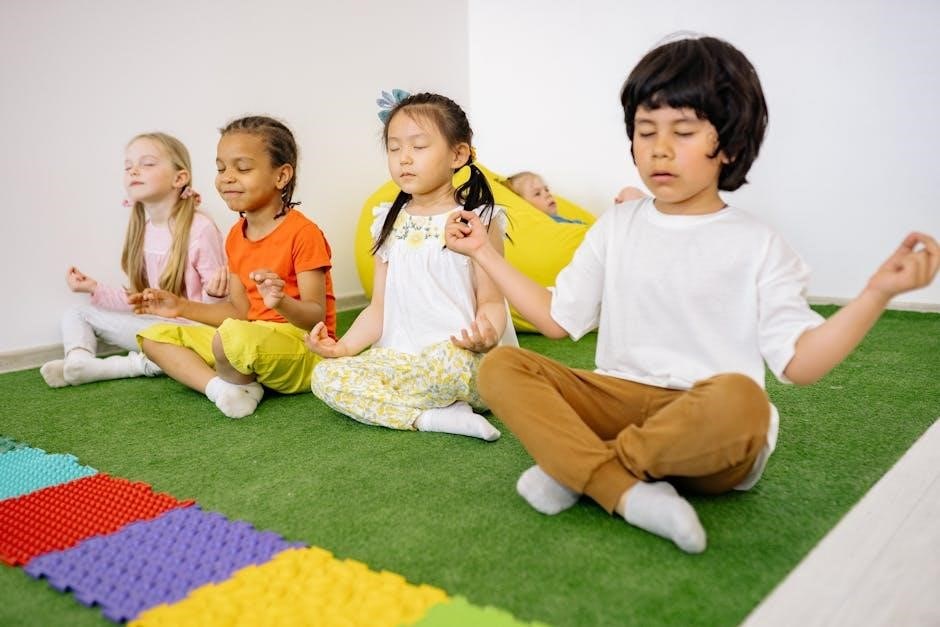
Language and Literacy Skills
Language and literacy skills form the foundation of learning; They include verbal communication, listening comprehension, and basic alphabet awareness, all essential for reading and academic success.
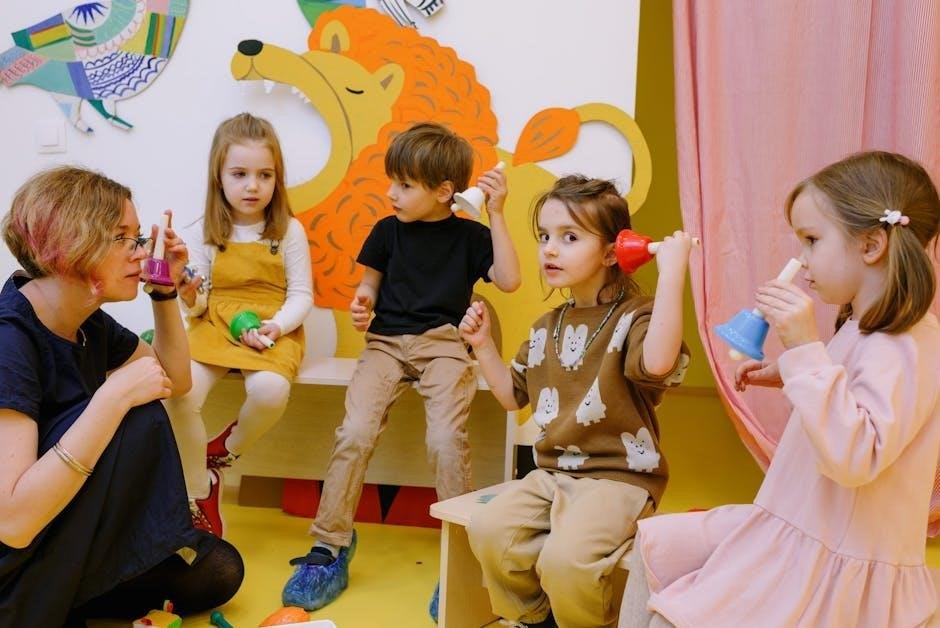
3.1. Verbal Communication and Vocabulary
Verbal communication and vocabulary are crucial for kindergarten success. Children should speak clearly, use complete sentences, and understand basic instructions. Expanding their vocabulary through conversations, stories, and play fosters effective expression and comprehension. Parents can encourage this by engaging in daily discussions, reading together, and introducing new words. These skills lay the groundwork for future academic achievements and social interactions.
3.2. Listening Comprehension and Following Directions
Listening comprehension and the ability to follow directions are fundamental skills for kindergarten readiness. Children should be able to understand and respond to simple instructions, engage in conversations, and retell stories in their own words. Practicing active listening through games, reading aloud, and interactive activities can enhance these skills. Mastery of following directions helps with classroom participation and completing tasks independently, setting a strong foundation for academic success.
3.3. Basic Alphabet and Phonological Awareness
Recognizing the alphabet and understanding phonological awareness are key literacy skills. Children should identify uppercase and lowercase letters, associate sounds with letters, and demonstrate an awareness of rhyming, syllables, and word segmentation. Engaging in activities like reading rhymes, singing alphabet songs, and playing word games can foster these abilities. These skills lay the groundwork for reading and writing, ensuring a smooth transition into kindergarten literacy activities.
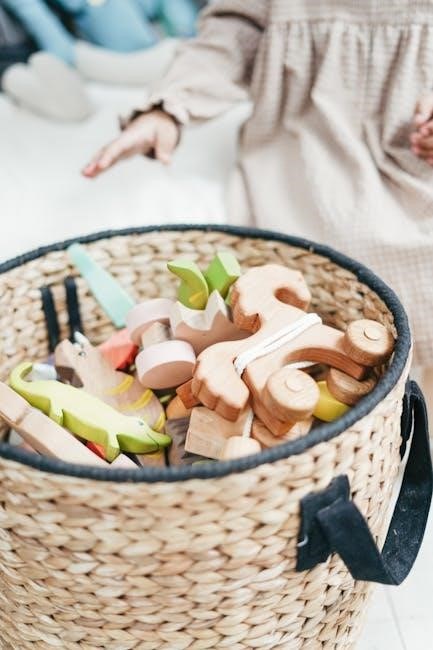
Mathematics and Problem-Solving
Recognizing numbers up to 20, counting accurately, and understanding basic math concepts like “more” or “fewer” are essential. Solving simple problems using objects enhances readiness.
4.1. Number Recognition and Counting
Recognizing numbers up to 20 and counting accurately are fundamental skills. Children should understand numerical concepts like “more” or “fewer” and identify numbers in different contexts. They should demonstrate the ability to count objects, recognize numerals, and associate them with their word forms. Practicing rote counting beyond 20, such as up to 50, is also beneficial. Understanding basic number relationships, like counting backward, enhances problem-solving abilities. These skills form a strong foundation for future math learning and should be encouraged through play and daily activities.
4.2. Basic Addition and Subtraction Concepts
Children should demonstrate an understanding of simple addition and subtraction using tangible objects. They can start with basic concepts like combining groups or taking away items to solve problems. For example, understanding that 2 + 1 equals 3 or that 5 ౼ 2 equals 3. Using everyday situations, like adding toys or subtracting blocks, helps reinforce these ideas. This foundational skill prepares them for more complex math in later years and enhances their problem-solving abilities through hands-on learning experiences.
4.3. Understanding Shapes and Patterns
Children should recognize and identify basic shapes, such as circles, squares, triangles, and rectangles. They should also demonstrate an ability to create and extend simple patterns using shapes or objects. For example, they can arrange toys or blocks in a sequence like red block, blue block, red block, and continue the pattern. This skill enhances spatial awareness and lays the foundation for math concepts. Understanding patterns helps children develop problem-solving abilities and think logically about sequences and relationships between objects.
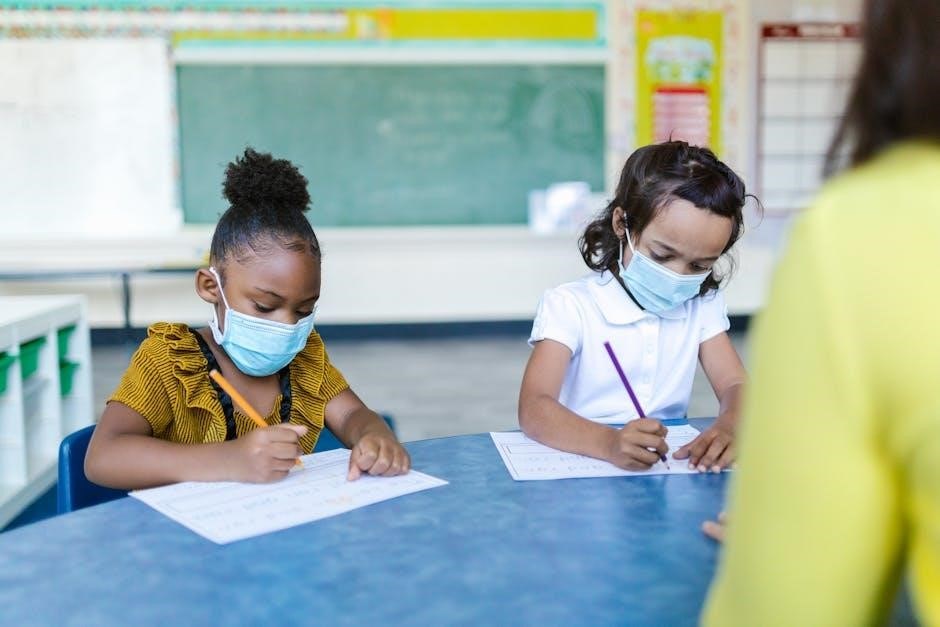
Physical and Motor Development
Children should demonstrate fine motor skills, such as using scissors, crayons, and pencils. They should also show gross motor abilities, like running, jumping, and balancing with coordination.
5.1. Fine Motor Skills: Using Scissors, Crayons, and Pencils
Children should demonstrate the ability to use scissors to cut straight lines and safely handle sharp objects. They should be able to grip crayons and pencils correctly, color within lines, and use different colors purposefully. Tracing shapes and writing their name legibly are key milestones. These skills are foundational for writing, drawing, and completing classroom activities independently, showcasing their hand-eye coordination and dexterity development.
5.2. Gross Motor Skills: Running, Jumping, and Balance
Children should demonstrate proficiency in running, jumping, and hopping with control. They should be able to balance on one foot for a few seconds and walk in a straight line. Skipping and kicking a ball forward are also key indicators. These skills reflect overall physical coordination and readiness for active play and movement-based activities in a kindergarten setting, promoting confidence and physical engagement with peers.
Self-Care and Independence
Self-care and independence are foundational skills for kindergarten success. Children should demonstrate the ability to dress, undress, and use the bathroom independently, showing growing self-reliance in daily tasks.
6.1. Dressing and Undressing Independently
Dressing and undressing independently is a key self-care skill for kindergarten readiness. Children should be able to put on and take off clothing, shoes, and accessories without assistance. This includes managing buttons, zippers, and fasteners. Practicing these tasks at home helps build confidence and fine motor skills. Using simple, kid-friendly clothing can make the process easier. Mastery of this skill promotes independence and reduces reliance on others for daily routines.
6.2. Using the Bathroom and Washing Hands
Using the bathroom independently is a crucial self-care skill for kindergarten readiness. Children should demonstrate the ability to use the toilet, wipe themselves clean, and wash their hands properly. Handwashing should include using soap and water for at least 20 seconds, especially before eating and after using the bathroom. Practicing these routines at home helps build independence and hygiene awareness, preparing your child for the expectations of a classroom environment.
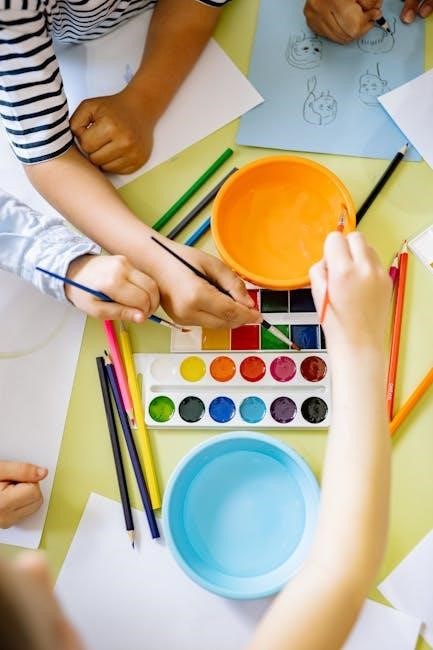
Cognitive Development
Cognitive development involves memory, sequencing, and problem-solving skills. Children should demonstrate curiosity, explore their environment, and show an ability to think critically and learn new concepts independently.
7.1. Memory and Sequencing Skills
Children entering kindergarten should demonstrate basic memory and sequencing skills. This includes recalling sequences of events, following multi-step directions, and identifying patterns. They should be able to retell simple stories, remember routines, and understand cause-and-effect relationships. These skills are foundational for problem-solving and learning. Encourage activities like sorting objects, matching games, and reading stories with clear beginnings, middles, and ends to strengthen these abilities. Memory and sequencing skills also support math and literacy development, helping children build a strong academic foundation.
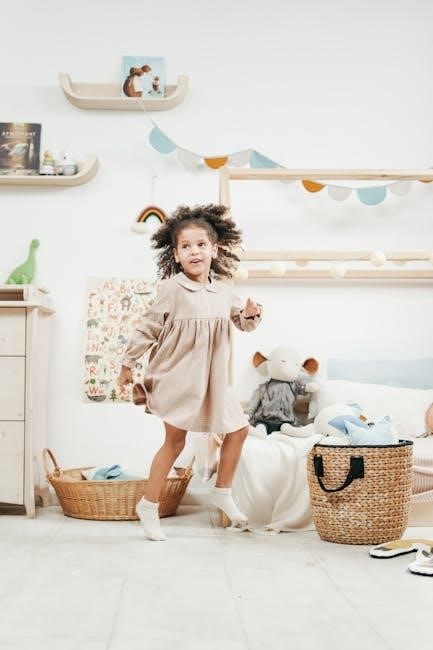
7.2. Curiosity and Exploration
Curiosity and exploration are vital for kindergarten readiness. Children should exhibit a natural interest in their environment, ask questions, and engage in hands-on activities. Encourage them to explore objects, materials, and concepts through play, fostering problem-solving skills and creativity. Activities like puzzles, building blocks, and open-ended questions can nurture their curiosity; This trait helps children adapt to new situations, fostering a love for learning and preparing them for future academic success. Promoting exploration builds confidence and independence, essential for thriving in a kindergarten setting.
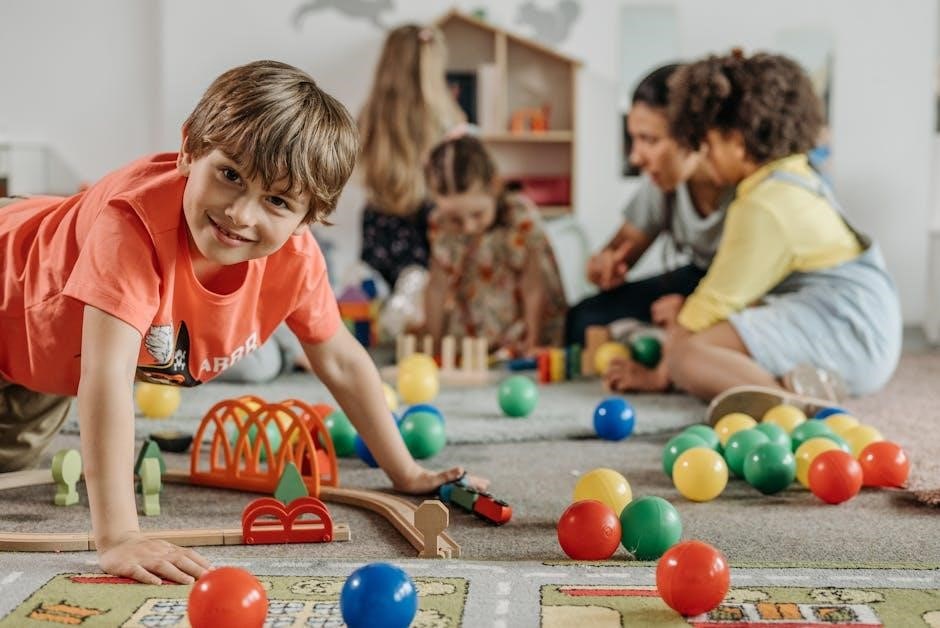
Additional Tips for Parents
Parents should use checklists to track progress, encourage learning through play, and establish daily routines. These strategies foster independence and prepare children for kindergarten success effectively.
8.1. Encouraging Learning Through Play
Play is a powerful tool for fostering skills essential for kindergarten readiness. Engage your child in activities like puzzles, building blocks, and art projects to enhance problem-solving and creativity. Reading, singing, and outdoor exploration also promote language development and curiosity. Encourage imaginative play to build social-emotional skills like cooperation and empathy. Provide materials like crayons, scissors, and glue for fine motor practice. By integrating learning into play, you create a fun, engaging environment that supports overall development and prepares your child for success.
8.2. Creating a Daily Routine
Establishing a consistent daily routine helps your child develop a sense of structure and responsibility, key for kindergarten success. Include time blocks for meals, sleep, homework, and play. Morning routines should focus on independence, like dressing and brushing teeth. Afternoons can involve outdoor activities and quiet time for reading or rest. Evenings should wind down with calming activities like storytelling. A predictable schedule builds self-discipline, reduces anxiety, and prepares your child for the structured environment of kindergarten.
